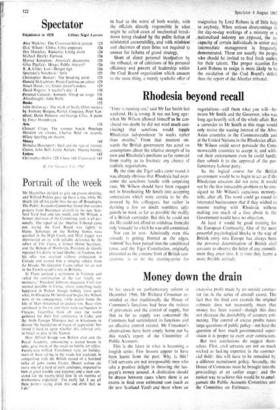Money down the drain
In his speech on parliamentary reform in December 1966, Mr Richard Crossman re- minded us that traditionally the House of Commons's functions had been the redress of grievances and the control of supply, but that as far as supply was concerned the Commons had surrendered its functions and no effective control existed. Mr Crossman's observations have been amply borne put by this week's report of the Committee of Public Accounts.
This is the latest in what is becoming a longish series. Few lessons appear to have been learnt from the past. Why is this? Civil servants are not irresponsible men who take a positive delight in throwing the tax- payer's money around. A distinction should be drawn between cases where there i6 excess in final over estimated cost (such as the new Scotland Yard) and those where an exce,,ive profit made by an outside contrac- tor (as in the series of aircraft cases). The fact that the final cost exceeds the original estimate does not necessarily mean that money has been wasted—though this does not decrease the desirability of accurate esti- mating. The control of excess profits raises large questions of public policy—not least the question of how much governmental super- vision it is proper to exert over contractors.
But two conclusions -do suggest them- selves. First, civil servants are not so much 'wicked as lacking expertise in the commer- cial field: this will have to be remedied by a -different recruitment policy. Secondly, the House of Commons must be brought into the proceedings at an: earlier stage: and the easiest way to-achieve this would be to atnal- gamate -the 'Public Accounts Committee and the Committee on Estimates.






























 Previous page
Previous page